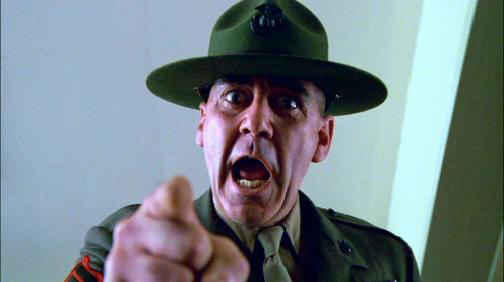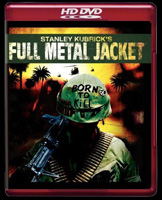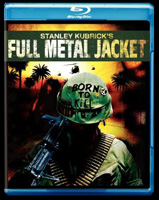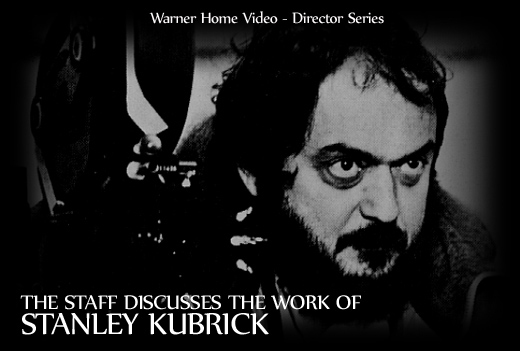
Day One – The Shining / Day Two – Full Metal Jacket / Day Three – Eyes Wide Shut
Day Four – A Clockwork Orange / Day Five – 2001: A Space Odyssey Mesage Board Discussion
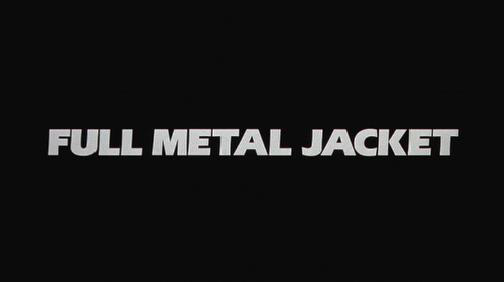
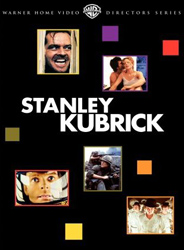 BUY IT AT AMAZON: CLICK HERE
BUY IT AT AMAZON: CLICK HERE
STUDIO: Warner Bros.
MSRP: $79.98
RATED: R
RUNNING TIME: 170 Minutes
SPECIAL FEATURES:
- Commentary by Adam Baldwin, Vincent D’Onofrio, R. Lee Ermey and Jay Cocks
- New Featurette: Full Metal Jacket: Between Good and Evil
- Theatrical trailer
The Pitch
Stanley Kubrick does Vietnam! R. Lee Ermey is introduced to the film world! A girl sniper! The 2 Live Crew is given the soundbyte of a lifetime! Matthew Modine replaces Anthony Michael Hall in the 11th hour and a career [and amazing metallic photo book] is born!
More Arliss Howard than the next leading brand!
Director: Stanley Kubrick
Cast: Matthew Modine, R. Lee Ermey, Vincent D’Onofrio, Adam Baldwin, Arliss Howard, Ed O’Ross, Dorian Harewood
Writers: Stanley Kubrick, Gustav Hasford, Michael Herr
The Nutshell
Stanley Kubrick goes to war again, this time escewing the bluntly anti-war stance of the unmissable Paths of Glory and
rather telling a war story that is grounded in combat and character
interactions both in training and in the thick of battle. Released at
the unfortunate time shortly after Oliver Stone’s Platoon took center stage, Full Metal Jacket has always been a divisive yet unforgettable film.
The CHUD.com Staff Ruminates on Full Metal Jacket:
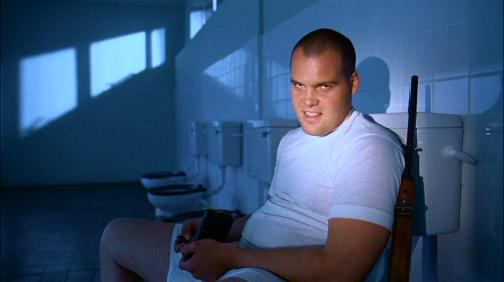
Is this the mainstream Stanley Kubrick movie? Is it as close as it gets? I don’t know for sure, because it’s always something that prohibits his films, though they’re widely known, from crossing completely over into the middle ground where audiences who aren’t film savvy can still enjoy them. I don’t count Spartacus as a fully Kubrickian [so much better than Galaxian] film for obvious reasons. 2001: A Space Odyssey is a mindbender that people discuss more than actually watch, The Shining gets the oddest spectrum of opinions, and people think that Barry Lyndon is that fat guy from Wargames. Is Full Metal Jacket the one?
For about an hour it is! Then, it shifts gears and becomes an entirely different and no less great film. Most folks tend to enjoy the more fun and fast-paced Parris Island scenes that made the film a bed of memorable quotes but I think those scenes have become so much a part of the film vernacular of everyone that the latter half still holds mystery and is the perfect payoff to the opening act. Much more so than any of the other Vietnam flicks [I’m afraid to watch The Boys in Company C, a childhood favorite that can’t have aged well] it doesn’t show you or tell you everything in its arsenal, making what is initially a rather cold and superficial aftertaste amplified by both the viewer’s frame of mind and the shadowy brilliance of the movie. It’s a really sneaky movie, luring you in with nearly every moment leading up the the soap and towel "Code Red" before getting hard and mean like nobody’s business. Films which shift gears either work [To Live and Die in LA, to a lesser extent the upcoming masterpiece No Country for Old Men] or don’t [Lost Highway, Dr. T. and the Women] and when they do it’s a divisive [synonymous with Stanley Kubrick] but extremely rewarding experience and for me Full Metal Jacket is near the top of the heap.
– Nick Nunziata
Where The Shining is Kubrick’s only genuine
horror entry, Full Metal Jacket is the one that stayed with me the
most. It’s not his best film, nor is it his most entertaining; it’s a
military house of horrors, and it scared me as a kid far more than The Shining
ever could. I remember my Dad talking about how close he came to being
drafted into Vietnam, and the reality of that never really sunk in
until I saw this film.
My grandfather was a marine in World War II, but he never, ever
spoke about it, and since he was really the only link to the armed
forces we had in our family, my exposure to anything military was
really limited. During the summer of 1991, when I was twelve, I saw Full Metal Jacket
for the first time. My family had rented an old cabin in Maine, and
that night I was home alone while my parents were out visiting friends.
I found the tape buried in a thick stack of other VHS titles (I clearly
recall Blue Steel being one of them) in an old oak cabinet beneath a
massive, ‘80’s-era rear projection CRT. I had remembered one of the
neighborhood kids saying something about there being “lots of boobs” in
the film, so, jumping at the chance to verify or debunk this rumor for
the good of science, I decided to watch it.
That kid turned out to be so very, very wrong.
After watching it, the idea of ever joining the military became
incomprehensible. I didn’t want to be a part of that cold and
terrifying world, and it made me wonder how my grandfather had ever
survived it. My grandfather’s silence about his time as a marine
started to make a lot more sense.
I have mixed feelings about this movie as I felt after the men got out
of boot camp it became a mediocre war movie. Kubrick was in top form
during the boot camp moments as this is where the young soldiers had to
grow up fast or else. My brother, who served in Vietnam, said that
Kubrick had gotten everything right about boot camp and for many
soldiers that part was more difficult than over in Vietnam.
– Eileen Bolender
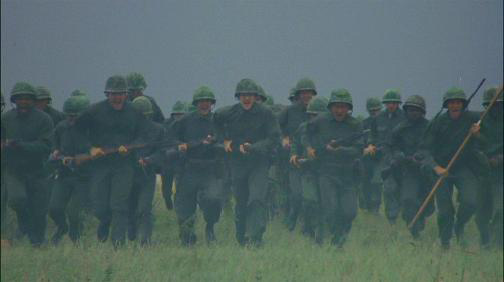
Know what? While The Shining could hardly scare me as a
kid, nothing creeped me out more than Gomer Pyle’s final moments in Full Metal Jacket.
Looking back on it now, maybe it’s because
there was the horror I was looking for- the person who was just pushed
and pushed until he snapped. (What can I say? I had rough high school
years…) There’s something truly terrifying and disturbing in his eyes
at the last moments, when he decides there’s no other way out, and it
always stuck with me.
Aside from the horrors and
dehumanization of the boots, most people shy away from the second part
of this film, claiming it to be inferior. They’re nuts. The second part
is just as haunting, just as depressing. Has there been a scarier
sniper scene, especially at the end when you find out who’s shooting at
them? Doesn’t the Americans distaste of the people they’re supposed to
be there to help disturb you? Who doesn’t get a chill from the end,
with the marines walking over a field singing the fucking Mickey Mouse
song as buildings burn in the background?
They should show the film in grammar schools. I can guarantee you no one would sign up to fight pointless wars.
When I look back at this flick, I still can’t over how Gomer Pyle
blowing his brains out in the toilet killed the film for me. It’s not
because I was attached to Pyle or even the Gunny. It’s just that the
second half of the film falls apart once it hit Vietnam. Sure, it
would’ve been difficult keeping a movie totally focused on the Paris
Island aspect of the story. Yet, I feel that’s where the meat of the
story existed.
Private Joker and the rest of his company arrive in the hell of Hanoi
only to discover that everything is as pointless as what came before.
Sure, you get the scene with the Vietnamese hooker who’ll love you long
time. But, what else is there after that? Hot Animal Machine blasting
the enemy from the side of a helicopter only drives home what happened
before. The War is pointless and it’s a mechanical system that will
continue and continue as long as there are cogs to be placed into the
greater scheme.
Right before Pyle shot himself in the Barracks’ toilet, he summed up
the film’s tone in a couple of words. “I am…in a world…of shit.”
It’s bleak as hell and it sums up everything that the fresh-faced doe
eyed American young men realize, as they enter a war of warfare where
they are nothing more than cannon fodder. Sure, Pyle comes to the point
of realization first, as he figures out that if he can’t handle the
Gunny’s shit in Basic Training, the combat in Southeast Asia is going
to break him down into nothing. He’s fucked in every direction and he
realizes that death is the only way out.
The point is driven home for the second time, which is part of the
reason why I hate the repetitive nature of the film. In hindsight, it
does serve to strengthen Private Joker’s arc. The young man starts with
a bad John Wayne impersonation and he ends up figuring out that “the
shit” is everywhere. But, he also has the knowledge of what Pyle did
and what the act means. Joker says the following some time after Pyle’s
death, “The dead know only one thing: it is better to be alive”. Taking
a cue from that Jungian duality of man that he explained to a
commanding officer, Joker has come to both sides of life in combat.
Joker isn’t willing to get picked off by some random asshole in a
burned out building, and he’s not going to give up and let the military
life drag him down. He’s a reporter by trade and he’s going to keep an
eye on the experience of a life in shit. Watching a young man have the
humor driven out of him and replaced with the need to capture the
horror of mindless violence is horror on a level that we don’t
acknowledge. It’s not as exciting as watching a couple of kids on a
backpacking trip getting taken to a torture camp. But, it’s horror
nonetheless.
Hated this one when it first came out. Absolutely hated it. I always
liked the first forty minutes or so—Vincent D’Onofrio and R. Lee Ermey
are both brilliant, and the whole section has a power right up there
with the best of Kubrick’s work. But the second half…I dunno. It
shifts, and quite jarringly, to follow the exploits of less-interesting
characters than Private Pyle and Sergeant Hartman through battle scenes
that, taken on their own, are so much less exciting and terrifying than
the ones in Platoon.
There’s my real issue—I preferred Oliver Stone’s view of Vietnam so
much more than the cold, sterile world Kubrick was showing me.
And then, as David Mamet once said, things changed. Platoon appears
more hackneyed and melodramatic with every passing year, whereas
only gets more interesting and thematically rich. The alienation and
impersonality I hated in the second half? That’s the point of the whole
fucking movie, and war itself! Kubrick’s arguing that to survive war,
you have to lose your identity. I wasn’t ready for that message when I
first saw the flick. I sure as shit am now. And as for the battle
scenes, I must have had my head up my ass; the confrontation against
the Vietnamese sniper is as gripping a piece of cinema as I’ve ever
seen.
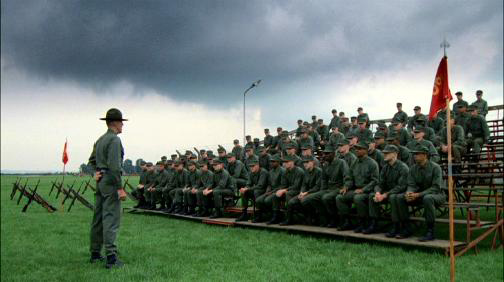
Do people turn off Full Metal Jacket
when the basic training sequence ends? The popular consciousness of this movie
ends the second Private Pyle shoots himself, and you know that someone is
really trying to prove to you how much they love films/Kubrick/unknown things
when they talk to you about the second half of the film.
The thing about the Vietnam portion of Full Metal Jacket is that it’s quite good. On its own its a strong bit of
filmmaking, filled with scenes that are electric and lines that are quotable.
But that first segment, the basic training stuff, is so perfect that the rest
of the movie seems overshadowed. I don’t think it really is – ‘Me love you long
time’ is a cultural cliche now, for one thing – but there’s something so bright
and vivid about the Parris Island sequences that for many people they are Full Metal Jacket.
It’s a common problem with Kubrick’s
films, where one element blinds people completely to the rest of what the
director is trying to say. While Full Metal Jacket is the most obvious example
of this, another movie that suffers is Barry Lyndon, which too many viewers
have taken to be nothing more than a thrilling, laugh a minute look at how poor
household lighting led to widespread dueling and gambling in the 1700s. At the
very least the Parris Island sequence culminates in a climax that anticipates
the finale – a completely dehumanized Private Pyle kills his drill instructor
tormentor and himself, while the film ends with a finally just as dehumanized
Joker killing the girl sniper. I’d like to advance the argument that the
starkly non-Vietnam looking setting of the second half of the film represents
the dehumanization of the people of that nation as a whole, but I just think
that Kubrick should have relented and shot somewhere on location.
It’s the blinding element that
divides the viewing public so starkly; people who only think of the first half
of Full Metal Jacket, or who think that the movie becomes less interesting
after that segment, are willfully missing the point, just as much as those who
complain about the changes between book and movie for The Shining or who can’t
understand how to integrate the Hal 9000 portion of 2001: A Space Odyssey into the whole. Or
those who bitch about the fact that A.I. continues after David is trapped at the
bottom of the sea floor. Yes, I went there.
– Devin Faraci
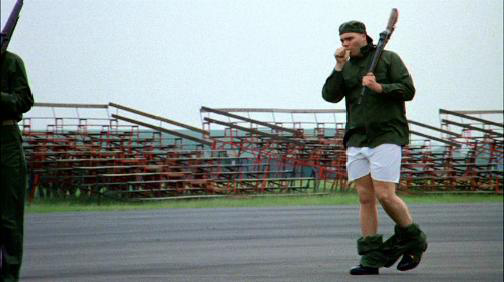
Being that
all cineastes are ravenous consumers of greatness (because it is such a
rarity), we still lament the passing of Kubrick as untimely (seventy-years-old
seeming too soon for one whose work could merge thousands of years with one
blink). Though most filmmakers burn brightly for a decade or two before sliding
into obsolescence, Kubrick was ever relevant; he absorbed technical advances,
occasionally pioneered them (as was the case with the 20:1 zoom lens for A
Clockwork Orange or the retrofitting of a 50mm Zeiss lens for candlelight
shooting on Barry Lyndon) and was practical in their application. True, he may have gone from representing the
state-of-the-art in the late 60s and early 70s to being somewhat out-of-time
with his last two pictures (Full Metal Jacket and Eyes Wide Shut), but the lack
of vigor that marks or mars the work of an aging director was never
present. Kubrick was as vital in 1999 as
he was in 1968.
The only
significant shift in Kubrick’s art was its ability to connect with (or,
frankly, make sense to) mainstream audiences.
By the time I was old enough to appreciate the rare experience of a new
Kubrick picture (I was thirteen when Full Metal Jacket hit theaters in 1987),
cultural sophistication in America was rapidly ebbing. The escapist sensations trotted out every
summer and holiday season had trained moviegoers to watch everything passively;
the only engagement required was the admission price. In the realm of wide-release entertainment
(and for all the harm they’ve done to his films since his death, you’ve got to
give Warner Brothers credit for not relegating his work to the country’s major
media centers while was alive), Kubrick stood alone. And Full Metal Jacket,
with its bisected narrative, did not go down well with folks who’d just
experienced (and been profoundly moved by) the classical narrative sledgehammer
of Platoon. So they praised the
profanely quotable surface of the boot camp segment and explained away the rest
of the film as "flawed" or "generic", willfully shrugging
off the summation of Kubrick’s treatise on dehumanization.
Of course,
it wasn’t until I was in my thirties that Full Metal Jacket‘s greatness began
to reveal itself (only Barry Lyndon has aged better); now, I’m just waiting for
the rest of the world to catch up.
If there’s one criticism people love to throw at Full Metal Jacket,
it’s that after the extraordinary (and markedly memorable) opening boot
camp sequence, the Vietnam scenes that comprise the second half of the
film pale by comparison. Nonsense. I’ve always felt that the second
half of Full Metal Jacket is just as good as, if not better
than, the first half. But while each section works just fine on its
own, the two halves fit together so strangely that once we reach
Vietnam, you can’t help but feel that there’s been a disconnect
somewhere. It’s not so much a question about quality as it is about
context: The Vietnam section of Full Metal Jacket doesn’t seem
to work when placed alongside the boot camp sequence, but that doesn’t
necessarily mean it doesn’t work on its own terms. Viewed as a single
cohesive story, Full Metal Jacket is unwieldy and odd, full of
pacing problems and jarring tonal shifts. But viewed as a two-part
anthology, each section compartmentalized with its own three-act
structure, the film’s pacing and tonal problems melt away, and becomes
a brilliant depiction of two men dehumanized by the specter of war.
There have been other movies to tell two parallel stories, though never in this way. The Godfather Part II,
for example, intercuts Michael’s story and Vito’s, placing scenes
side-by-side in order to draw parallels between the two mens’ lives.
Kubrick could’ve used that same strategy here, and used flashbacks
interspersed with the Vietnam sequences to give the boot camp sequence
greater context in relation to Joker’s wartime experiences. But he
doesn’t; he chooses to simply present the two sections as independently
of one another as possible, allowing us to draw our own connections.
Still, I can understand where the criticisms of
Full Metal Jacketare coming from. I love both sections of the movie just about equally,
albeit for completely different reasons. But there’s no denying the
lack of cohesion between the two halves, and while that lack of
cohesion is clearly intentional and for effect, it can definitely be
distracting for an audience. Especially since the boot camp sequence is
so grandiose and bombastic, and the Vietnam sequence so much more sly
and ironic, that the hijinks of Gunnery Sergeant Hartman and Private
Pyle tend to overwhelm the rest of the movie. It’s a shame, because the
rest of the movie is pretty damn good too.
So
is there a comma in "Until there is no enemy, but peace." Or not?
That question, which crops up at the end of the Marines’ litany to the rifle,
is what keeps me coming back to Full Metal Jacket, not the
self-evidently perfect first forty-five minutes, or the drawn out, audience
alienating balance of the film. Those two halves, which seem so removed from
one another, are intricately linked and wholly necessary to pose the question
that Kubrick wants to ask. You know, the Jungian one.
The
dehumanization and homogenization that Kubrick so brilliantly portrays in the
boot camp sequences remains the film’s most digestible discourse; no one can
possibly miss the points the film is making at Parris Island. Thank R. Lee
Ermey for that, and don’t blame him for later becoming a caricature of himself
in countless other films and television appearances. We’ve always got this
line: "Those individuals showed what one motivated Marine and his rifle
can do."
But
that question — are the V.C. the enemy, or is peace? — is only set up while
the kids are on the Island. Not that there’s any answer in the end, but the
long road Joker walks while out in the shit is as much of a conclusion as we’re
going to get. Gomer Pyle’s insanity means nothing without the balance of Animal
Mother and the ‘get some!’ helicopter gunner. The film is totally in balance,
in the service to that question: Hartman’s leadership skills and Cowboy’s lack
thereof; Joker’s approach to reporting and Lockhart’s disinterest, and the horrifying
conclusion, where Joker shoots a dying V.C. woman after not being able to stop
Pyle.
Looking
at the film now, I see peace, the enemy, in that moment in time where bullets
aren’t flying and the snipers are dead. Joker doesn’t execute or humanely kill
a dying enemy; he kills as lip service to mercy and peace, but all he’s doing
is fulfilling the mandate to kill he’s hoped to live up to all along: born to
kill. When Joker pulls the trigger at the end of Full Metal Jacket the movie
becomes more bleak and awful than anything else Kubrick created; A Clockwork
Orange, The Shining and even Paths of Glory can’t hold a candle to the human
nihilism we take away from this film.
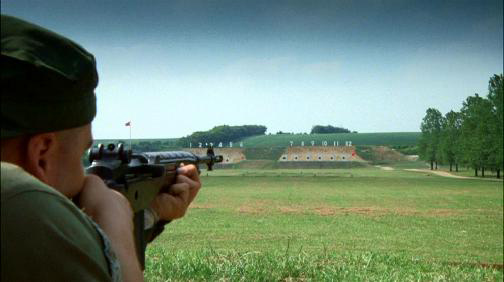
The Package
Listening to R. Lee Ermey, Vincent D’Onofrio, Adam Baldwin, and Jay Cocks discuss the making and impact of this film on a commentary track is truly all the reasoning anyone needs to buy this DVD. While it’s not a filmmaking masterclass, it’s nearly as interesting as the dialogue onscreen, watching this movie as these folks talkabout it. D’Onofrio in particular is very forthcoming and revealing about his process and working with Kubrick and I was blown away by how fast a very long movie blew past me while hearing these folks tell their stories. There’s a bit of debate as to the final relationship between R. Lee Ermey and Kubrick in the wake of this film’s release, but his presence on the track is also phenomenal. I don’t anyone can argue that the film simply wouldn’t work without his onscreen and behind the scenes contributions to the film and he delivers famously on the track. He’s obviously not the generic character we’ve seen him play dozens of times [though his performance in Dead Man Walking is a nice departure] on the track, revealing a somewhat elegant speaker with more knowledge and experience in his pinky than the site’s entire staff has in their bodies [even Devin!].
The featurette is no slouch either and whether you get the HD, BluRay, or [as I was sent] the regular version this is a really special and WIDESCREEN must-own product.
9.5 out of 10
